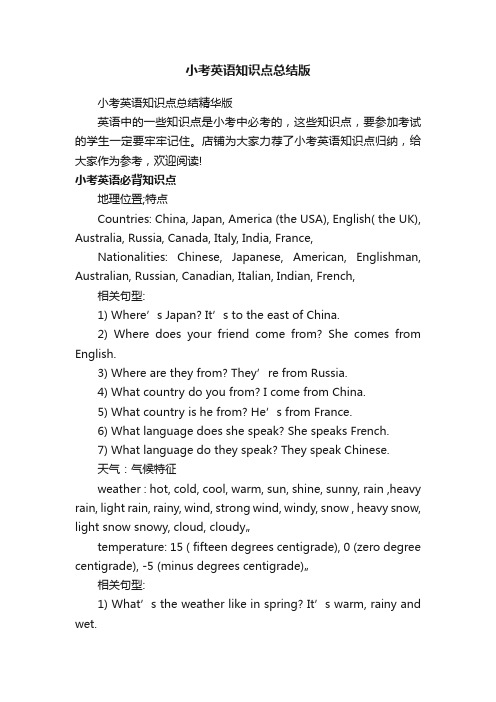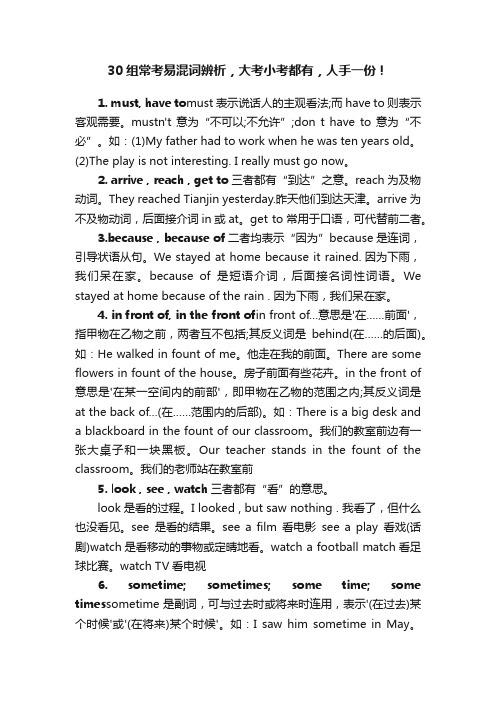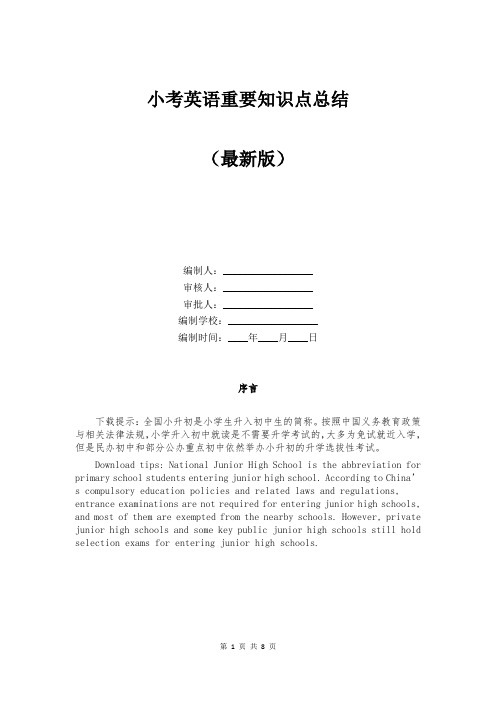小考语法词组
小考英语知识点总结版

小考英语知识点总结版小考英语知识点总结精华版英语中的一些知识点是小考中必考的,这些知识点,要参加考试的学生一定要牢牢记住。
店铺为大家力荐了小考英语知识点归纳,给大家作为参考,欢迎阅读!小考英语必背知识点地理位置;特点Countries: China, Japan, America (the USA), English( the UK), Australia, Russia, Canada, Italy, India, France,Nationalities: Chinese, Japanese, American, Englishman, Australian, Russian, Canadian, Italian, Indian, French,相关句型:1) Where’s Japan? It’s to the east of China.2) Where does your friend come from? She comes from English.3) Where are they from? They’re from Russia.4) What country do you from? I come from China.5) What country is he from? He’s from France.6) What language does she speak? She speaks French.7) What language do they speak? They speak Chinese.天气:气候特征weather : hot, cold, cool, warm, sun, shine, sunny, rain ,heavy rain, light rain, rainy, wind, strong wind, windy, snow , heavy snow, light snow snowy, cloud, cloudy…temperature: 15 ( fifteen degrees centigrade), 0 (zero degree centigrade), -5 (minus degrees centigrade)…相关句型:1) What’s the weather like in spring? It’s warm, rainy and wet.2) What will the weather be like there? It will be sunny.3) Is it snowing? Yes, it is a snowy day.4) Will there be cloudy? Yes, there will.5) The sun is shining.6) I like taking a warm bath.小考英语必考知识点长着和穿着长着什么用with如:the girl with big eyes 大眼睛的'女孩;穿着什么用in如:the man in black穿黑衣服的男人或:the woman in the white skirt 穿白色短裙的妇女让某人做某事用let sb后加动词原形如:Let’s water the flowers together.是该做…的时候了用It’s time for+名词或It’s time to +动原。
XS湘少版小学六年级英语 下册 期末考试 小升初毕业 小考(总复习专题训练)——-语法2

小学英语语法及习题一、名词复数规则1.一般情况下,直接加-s,如:book-books, bag-bags, cat-cats, 2.以s. x. sh. ch 结尾,加-es,如:bus-buses, box-boxes, brush-brushes, watch-watches3.以“辅音字母+y”结尾,变y为i, 再加-es,如:family-families,strawberry-strawberries4.以“f或fe”结尾,变f或fe为v, 再加-es,如:knife-knives5.不规则名词复数:man-men, woman-women, policeman-policemen, policewoman-policewomen, mouse-mice child-children ,foot-feet,.tooth-teeth,fish-fish, people-people,Chinese-Chinese, Japanese-Japanese写出下列各词的复数this _______watch _______child _______photo ________ day________foot________ book_______ dress ________tooth_______ sheep ______box_______ strawberry _____thief _______yo-yo ______ peach______ sandwich ______man______woman_______ paper_______ water________二、一般现在时一般现在时基本用法介绍【No. 1】一般现在时的功能1.表示事物或人物的特征、状态。
如:The sky is blue.天空是蓝色的。
2.表示经常性或习惯性的动作。
如:I get up at six every day.我每天六点起床。
2023-2024学年小升初英语语法专题复习-词法(动词)

词法9: 动词 表示人或物的动作(如 ask 、walk 等)或状态(如have 、become 等)的词叫动词。
动词有数、人称和时态的变化。
考点一:动词的分类按照动词的词义和动词在句子中所起的作用来划分,动词可以分为四类: 实义动词、系动词、助动词和情态动词。
1. 实义动词。
实义动词本身具有实际意义,能够表达主语的动作或本身存在的状态,在句子中独立充当谓语它本身有两种存在形式,一种是及物动词,另外种是不及物动词。
考点解读 动词思维导图 动词知识讲解 考点透析(1)及物动词后面直接带宾语,表达完整的意思。
We study English. 我们学英语。
(study 是及物动词,直接跟宾语English)(2)不及物动词后面不能直接带宾语,它自己本身就能表达完整的意义。
The bus stopped. 车停了。
(stop 是不及物动词)2.系动词。
系动词又叫连系动词,本身有词义,但不能单独作谓语,必须和表语一起构成谓语,说明主语的状态、性质、待征或身份。
系动词在小学阶段主要是be 动词(am、is、are)具体变化表格如下:其他常见的系动词有seem(似乎)、look(看上去)keep(保持)、become(变成)、get(变得)、taste(尝起来)、feel(觉得)、turn(变为,变成)等It tastes good. 味道不错。
That sounds good. 听起来不错。
They look young. 他们看起来年轻。
3.助动词。
助动词本身无词义或意义不完整,不能单独作谓语。
它必须和别的动词连用,帮助构成各种时态否定句和疑问句等结构。
小学中常见的助动词有be、do、does、did、will、would 利shall 等(1)助动词be(am、is、are)“助动词be+现在分词”构成现在进行时I'm drawing pictures. 我在画画。
My father isn't writing an email. 我爸爸没在写电子邮件。
30组常考易混词辨析,大考小考都有,人手一份!

30组常考易混词辨析,大考小考都有,人手一份!1. must, have to must表示说话人的主观看法;而have to则表示客观需要。
mustn't意为“不可以;不允许”;don t have to意为“不必”。
如:(1)My father had to work when he was ten years old。
(2)The play is not interesting. I really must go now。
2. arrive , reach , get to三者都有“到达”之意。
reach为及物动词。
They reached Tianjin yesterday.昨天他们到达天津。
arrive为不及物动词,后面接介词in或at。
get to常用于口语,可代替前二者。
3.because , because of二者均表示“因为”because是连词,引导状语从句。
We stayed at home because it rained. 因为下雨,我们呆在家。
because of是短语介词,后面接名词性词语。
We stayed at home because of the rain . 因为下雨,我们呆在家。
4. in front of, in the front of in front of…意思是'在……前面',指甲物在乙物之前,两者互不包括;其反义词是behind(在……的后面)。
如:He walked in fount of me。
他走在我的前面。
There are some flowers in fount of the house。
房子前面有些花卉。
in the front of 意思是'在某一空间内的前部',即甲物在乙物的范围之内;其反义词是at the back of…(在……范围内的后部)。
如:There is a big desk and a blackboard in the fount of our classroom。
小升初英语40背重点句型与十大语法知识点_1

小升初英语40背重点句型与十大语法知识点学校学到的英语词汇与语法不单单在学校用得上,在学校与高中都用得上,所以这些学问是必需要把握的,我在这里整理了英语句子与语法复习资料,期望能帮到您。
小升初英语40背重点句型1. allow sb to do sth 允许某人去做某事(后接动词不定式)My father allowed me to go out for a walk after finishing my homework.2. asked sb (not) to do sth 叫某人做事某事(叫某人不要去做某事)My father asked me to study hard.He asked me not to swim alone.be asked to do sth 被叫去做某事/被邀请去做某事I was asked to have a dinner with them yesterday.3. be afraid to do sth 可怕做某事She is afraid to ask me questions.4. be afaid of doing sth 可怕做某事I am afraid of going out at night.5. be afaid of sth 可怕某物He is afraid of snakes.6. be amazed to do sth 对做某事感到惊异He was amazed to meet the girl there.be amazed at sth 对某事感到惊异they were amazed at the news.7. be busy doing/with sth 忙于做某事(常考)I was busy washing my car at that time. 那时候我正忙于清洗我的车子。
I am busy with my work.8. becoming/going/leaving/fiying/moving/dying(某些位移动词用进行时态时表将来)the bus is coming/the dog is dying.9. be excited to do sth 对做感到兴奋Jacky was excited to travel there by plane.be excited at sthLily was excited at his words.be excited about doing sthhe was excited about passing the exam without going overing books.10. be frightened to do sth 可怕去做某事Sam is frightened to ride a horse.11. be glad/happy to do sth 兴奋去做某事She is happy to clean theblackboard with me.be pleased to do sth兴奋做某事She was pleased to helpthe old man yesterday.be pleased with sth 对某事感到兴奋/满足The teacher was pleasedwith my answer.12.be interested in sth/doing sth 对某事感爱好/对做某事感爱好She is interested inswimming in the river.My btother is interestedin Chinese.13. be/get ready for/to do sthbe ready for 为某事做好了预备We are ready for the exam.Be ready to do sth 为做某事做好了预备We are ready to have a birthday party for her.get ready for sth为某事在做预备We are getting ready for the exam.14. be surprised to do sth 对做某事感到惊异be surprised at sth 对某事感到惊异This is nothing to be surprised at.Id be surprised to see him on such an occasion.15. be worth doing sth 值得做某事(worth 后接动词-ing形式,常考)It was too remote to be worth thinking about.16. 开头去做某事begin to do sth begin/start to do/doing sthWhen do children begin to go to school?17. can/be able to afford (to buy) sth 有力量负担(购买) At this rate we wont be able to afford a holiday.18. can/may/must do sth could/would/should/might do sth We may come at another time.19. cant wait todo sth 迫不急待地去做某事I cant wait to hear the news.20. decide to do sth 打算去做某事make up ones mind to do sth 下决心去做某事(常考)make a decision to do sth 对做某事作出打算What do they decide to do?I have made up my mind to go with him21. deserve to do sth 值得/应当做We must admit that she did deserve to win.22. encourage sb to do sth 鼓舞某人去做某事Encourage them to do some other helpful recreations.23. enjoy doing sth 喜爱去做某事I enjoy reading the story book24. expect (sb) to do sth 期望去做某事Dont expect him to help you.25. fail to do sth 做某事失败succeed doing sth 胜利做了某事If you don t work, you willfail to pass the exam.26. finish doing sth 做完某事(后接动词-ing形式)(常考)After finish doing your homework, you can have a rest.27. follow sb to do sth 跟随某人去做某事Follow me to read the new words.28. get sb to do sth / make sb do sth/ let sb do st 让某人做某事(后接动词原形)Her jokes made us laugh.29. get/have a chance to do sth 得到一个做某事的机会Im very happy to have a chance to visit your school.30. give/pass/show/lend/sell sb sth/sth to sbbuy/get/bring sb sth/sth for sbPlease give me a piece of paper.I bought him a drink in return for his help.31. go on to do sth /go on doing sth 连续做事(常考) Go on doing the exercise after a short rest.32. hate to do/doing sth 厌烦/不喜爱做某事Ihate to tell the news to you.33. have fun doing sth 做某事很好玩Have fun getting to know each other.34. have problems doing sth 做某事遇到困难Many people have problems getting to sleep at night.35. have sb do sth/have sth done 让某人做某事This is the best work you have ever done.36. hear sb do sth 听到某人做某事(后接动词原形,常考) hear sb doing sth 听到某人正在做某事(常见)I heard someone laughing.37. help to do sth 帮忙做某事help sb (to) do sth 帮忙某人做某事Ill help you clean the room.38. hope/wish to do sth 期望做某事wish sb to do sth 期望某人做某事I wish to take this opportunity to thank you all.39. It seems that 这像是(后接从句)seem to do sthseem +adjItseems that you are lying.Does that seem to make sense?40. Its + adj+(for sb) to do sth .Its+adj +(of sb) to do sthIts glad for him to hear the news.小升初英语必备10大语法学问点一、学校英语形容词性物主代词1、形容词性物主代词8个:My your his her its our your their我的你的他的她的它的我们的你们的他(她、它)们的2、形容词性物主代词的特点:1)译成汉语都有的 eg:my 我的 their 他们的2)后面加名词: eg:my backpack his name3)前后不用冠词 a an theThis is a my eraser(错误) That is your a pen(错误) Its his the pen(错误)3、I(物主代词)my you(物主代词)your he (物主代词)her we (物主代词) our注:在变物主代词时,把原题所给的词加上的,再译成单词就可以了。
小考英语重要知识点总结

第 1 页 共 8 页 小考英语重要知识点总结 (最新版)
编制人:__________________ 审核人:__________________ 审批人:__________________ 编制学校:__________________ 编制时间:____年____月____日
序言 下载提示:全国小升初是小学生升入初中生的简称。按照中国义务教育政策与相关法律法规,小学升入初中就读是不需要升学考试的,大多为免试就近入学,但是民办初中和部分公办重点初中依然举办小升初的升学选拔性考试。
Download tips: National Junior High School is the abbreviation for primary school students entering junior high school. According to China’s compulsory education policies and related laws and regulations, entrance examinations are not required for entering junior high schools, and most of them are exempted from the nearby schools. However, private junior high schools and some key public junior high schools still hold selection exams for entering junior high schools. 第 2 页 共 8 页
小考英语重要知识点总结 六年级的学生要在小考中取得好的英语成绩,同学们就一定要掌握每个单元的知识点。小编为大家力荐了小考英语知识点归纳,给大家作为参考,欢迎阅读!
中小学英语考试常考最全语法总结(简短记忆版)
期末复习语法知识库一、非谓语动词1.基本形式及变体注:非谓语动词的否定式就是在非谓语动词前直接加not。
2.非谓语动词作主语1.哪些常见形式可以做主语?敲黑板:能做主语的谓语动词有to do,doing,doing表示经常的动作;to do表示一次的,具体的动作。
2.固定句型敲黑板:经常用it作形式主语,固定句型如下:It be+adj.(+for sb.)+to do sth.;It be useless/no use/(no)good/a waste of time+doing sth.;There be+no+noun.(use/good/point/sense)+(in)doing sth.;3.疑问词+to do做主语3.非谓语动词作宾语作宾语的非谓语动词,只有V-ing和to do,置于动词或者介词后。
1.固定搭配1)只能接to do做宾语的动词:decide/determine,expect/hope/wish,refuse,manage,pretend,offer,promise, plan/intend,agree,afford,threaten,happen,wait等2)只能用doing作宾语的动词:consider,suggest/advise,admit,mention,delay/put off/postpone,fancy/feel likeavoid,keep/keep on,practice,deny,finish,enjoy/appreciate,forbid,imagine,risk,stand/bear,mind,allow/permit,escape3)to do,doing来者不拒Remember to go to the post office after school.Don't you remember seeing the man before?敲黑板:forget/remember/regret to do动作未发生forget/remember/regret doing动作已发生stop to do/go on to do另一件事情stop doing/go on doing同一件事情mean to do打算做...mean doing意味做...try doing试着做…try to do设法做...4)有人to do,没人doingallow/permit/forbid/advise sb to doallow/permit/forbid/advise doing2.介词+doing敲黑板:常见的短语有be used/accustomed to,be opposed to,object to,make contributions to, devote…to,lead to,stick to,insist on,get down to等。
小考英语语法专题之动词第三人称单数的变化规则及练习
小考英语语法专题之动词第三人称单数的变化规则及练习1. 大部分单词可以直接在动词后:+s例:like -- likesplay -- playswork--worksread--readswrite--writesShe likes cola.发音规则:所加的“s”在清辅音后,发【s】,works在浊辅音及元音后,发【z】,plays在 d 后与s 一起发【dz】,reads在t 后与s 一起发【ts】,writes2. 以s, x, sh, ch,结尾的动词:+es例:watch -- watchesbrush-- brusheswash--washesHe watches TV every day.发音规则:词尾加的“es”,发【iz】3. 以辅音+o 结尾的动词:+es例:go -- goesdo -- doesHe goes to school at 7o'clock in the morning.发音规则:词尾加的“es”,发【z】,does4. 以辅音+y 结尾的动词: 变y 为i+es例:fly -- fliesstudy -- studiescarry--carriesHe studies very hard.发音规则:词尾加的“es”,发【iz】,carries5. 不规则变化:例:have -- hasI have some milk.He has some milk.be 动词的单三形式是:is小练笔:1. 写出下列动词第三人称单数。
drink ________ go _______stay ________ make _______look _________ have_______pass_______ carry________come________ watch______plan_______ fly ________study_______ brush________do_________ teach_______2. 用所给单词的适当形式填空。
六年级小考英语知识点归纳
六年级小考英语知识点归纳英语是一门广泛使用的国际语言,在学生学习过程中扮演着重要的角色。
掌握好英语知识点,对于六年级学生来说尤为关键。
本文将对六年级英语知识点进行归纳总结,以帮助学生更好地备考小考。
一、词汇1. 动词的时态:包括一般现在时、一般过去时、现在进行时等。
例如:- I play chess every afternoon.(我每天下午都玩国际象棋。
) - He visited his grandparents last weekend.(上周末他拜访了他的祖父母。
)- They are watching TV now.(他们正在看电视。
)2. 名词与冠词:包括可数名词和不可数名词的用法,以及冠词a/an和the的区别。
例如:- I have two cats and three dogs.(我有两只猫和三只狗。
)- Can you pass me a pen?(你能给我递个钢笔吗?)- The sun rises in the east.(太阳从东方升起。
)3. 形容词与副词:包括形容词和副词的比较级和最高级的构成方式。
例如:- The book is more interesting than the movie.(这本书比电影更有趣。
)- He runs the fastest among all the students.(他是所有学生中跑得最快的。
)4. 量词和数字:包括基数词和序数词的用法,以及数字的表达方式。
例如:- I have four brothers and two sisters.(我有四个兄弟和两个姐妹。
)- Today is the twentieth of May.(今天是五月二十日。
)二、语法1. 句子的基本结构:包括主语、谓语和宾语的搭配方式,以及句子的基本顺序。
例如:- She is reading a book.(她正在读一本书。
)- My father bought me a new bike.(爸爸给我买了一辆新自行车。
小考英语的基础知识点汇总
小考英语的基础知识点汇总在小考里面,英语是很重要的一门科目,要想获得好成绩,打好基础很重要。
小编为大家力荐了小考英语的基础知识点总结,给大家作为参考,欢迎阅读!小考英语的必背知识点否定句表示某一否定意思。
句中一定有not。
有三种可能:be动词(am、is、are、was、were)+not、情态动词(can、must、should)+ not、助动词(do、does、did) + not一般疑问句表示疑问,一般回答只有两种可能Yes,……或No,……句中没有疑问词。
如何将一个肯定的陈述句改为否定句:1、看句中有无be动词,如有,把be动词提到句首即可。
2、看句中有无情态动词,如有,把情态动词提到句首即可。
特殊疑问句表示疑问,有疑问词(在开头),回答有很多种可能。
常用疑问词:What、When、Which、Who、Whose、Why、How时态一般现在时(1)句中be动词和动词一般情况下只能有一种而且也必须有一种。
如:The children are very happy on Christmas Day .She often does some housework at the weekend .小考英语的必考知识点like一词的用法like用作及物动词,译为“喜欢”。
(1)后接名词或代词,表示喜欢某人或某物。
如:I like the baby very much. 我非常喜欢这个小孩。
(2)后接动名词(v. -ing),表示“喜欢做某事”,着重于习惯、爱好。
如:Tom likes playing football. 汤姆喜欢踢足球。
(3)后接动词不定式(to do ),表示“偶尔地喜欢做某事”,着重于某次具体的行为。
如:I like reading, butI like to watch TV this evening. 我喜欢读书,但我今晚想看电视。
句子单数变复数,注意以下五要素(1)主格人称代词要变成相应的复数主格人称代词,即I→we, you→you,she,he,it→ they。
- 1、下载文档前请自行甄别文档内容的完整性,平台不提供额外的编辑、内容补充、找答案等附加服务。
- 2、"仅部分预览"的文档,不可在线预览部分如存在完整性等问题,可反馈申请退款(可完整预览的文档不适用该条件!)。
- 3、如文档侵犯您的权益,请联系客服反馈,我们会尽快为您处理(人工客服工作时间:9:00-18:30)。
G5 短语词组汇编 1. allow sb to do sth允许某人去做某事(后接动词不定式) My father allowed me to go out for a walk after finishing my homework. 2. asked sb (not) to do sth叫某人做事某事(叫某人不要去做某事) My father asked me to study hard. He asked me not to swim alone. be asked to do sth被叫去做某事/被邀请去做某事 I was asked to have a dinner with them yesterday. 3. be afraid to do sth害怕做某事 She is afraid to ask me questions. 4. be afaid of doing sth害怕做某事 I am afraid of going out at night. 5. be afaid of sth害怕某物 He is afraid of snakes. 6. be amazed to do sth对做某事感到惊讶 He was amazed to meet the girl there. be amazed at sth对某事感到惊讶 they were amazed at the news. 7. be busy doing/with sth忙于做某事(常考) I was busy washing my car at that time. 那时候我正忙于清洗我的车子。 I am busy with my work. 8. becoming/going/leaving/fiying/moving/dying(某些位移动词用进行时态时表将来) the bus is coming/the dog is dying. 9. be excited to do sth对做……感到兴奋 Jacky was excited to travel there by plane. be excited at sth Lily was excited at his words. be excited about doing sth he was excited about passing the exam without going overing books. 10. be frightened to do sth害怕去做某事 Sam is frightened to ride a horse. 11. be glad/happy to do sth高兴去做某事 She is happy to clean theblackboard with me. be pleased to do sth高兴做某事 She was pleased to helpthe old man yesterday. be pleased with sth对某事感到高兴/满意 The teacher was pleasedwith my answer.
12.be interested in sth/doing sth对某事感兴趣/对做某事感兴趣 She is interested inswimming in the river. My btother is interestedin Chinese.
13. be/get ready for/to do sth be ready for 为某事做好了准备 We are ready for the exam. Be ready to do sth为做某事做好了准备 We are ready to have a birthday party for her. get ready for sth为某事在做准备 We are getting ready for the exam.
14. be surprised to do sth对做某事感到惊奇 be surprised at sth对某事感到惊奇 This is nothing to be surprised at. I'd be surprised to see him on such an occasion. 15. be worth doing sth值得做某事(worth 后接动词-ing形式,常考) It was too remote to be worth thinking about. 16. 开始去做某事begin to do sth begin/start to do/doing sth When do children begin to go to school?
17. can/be able to afford (to buy) sth有能力负担(购买)…… At this rate we won't be able to afford a holiday.
18. can/may/must do sth could/would/should/might do sth We may come at another time.
19. can't wait todosth迫不急待地去做某事 I can’t wait to hear the news.
20. decide to do sth决定去做某事 make up one's mind to do sth下决心去做某事(常考) make a decision to do sth对做某事作出决定 What do they decide to do? I have made up my mind to go with him 21. deserve to do sth 值得/应该做…… We must admit that she did deserve to win.
22. encourage sb to do sth 鼓励某人去做某事 Encourage them to do some other helpful recreations.
23. enjoy doing sth 喜欢去做某事 I enjoy reading the story book
24. expect (sb) to do sth 期望去做某事 Don't expect him to help you.
25. fail to do sth 做某事失败 succeed doing sth 成功做了某事 If you don' t work, you willfail to pass the exam.
26. finish doing sth 做完某事(后接动词-ing形式)(常考) After finish doing your homework, you can have a rest.
27. follow sb to do sth 跟随某人去做某事 Follow me to read the new words.
28. get sb to do sth / make sb do sth/ let sb do st 让某人做某事(后接动词原形) Her jokes made us laugh.
29. get/have a chance to do sth 得到一个做某事的机会 I'm very happy to have a chance to visit your school.
30. give/pass/show/lend/sell sbsth/sth to sb buy/get/bring sbsth/sth for sb Please give me a piece of paper. I bought him a drink in return for his help. 31. go on to do sth /go on doing sth继续做事(常考)
Go on doing the exercise after a short rest. 32. hate to do/doing sth讨厌/不喜欢做某事 Ihate to tell the news to you.
33. have fun doing sth 做某事很有趣 Have fun getting to know each other.
34. have problems doing sth做某事遇到困难 Many people have problems getting to sleep at night.
35. have sb do sth/have sth done 让某人做某事
This is the best work you have ever done. 36. hear sb do sth听到某人做某事(后接动词原形,常考) hear sb doing sth听到某人正在做某事(常见) I heard someone laughing.
37. help to do sth帮忙做某事 help sb (to) do sth帮助某人做某事 I'll help you clean the room. 38. hope/wish to do sth希望做某事 wish sb to do sth希望某人做某事 I wish to take this opportunity to thank you all.
39. It seems that 这像是……(后接从句) seem to do sth seem +adj It'seems that you are lying. Does that seem to make sense?
40. It's + adj+(for sb) to do sth . It's+adj +(of sb) to do sth It's glad for him to hear the news.
41. It takes sb sometime/money to do sth . 花费某人多长时间做某事(常考) It takes me an hour to walk there and back.
42. pay …for… cost spend…on….. it take …to do sth 花费 He paid for it out of his own pocket.
